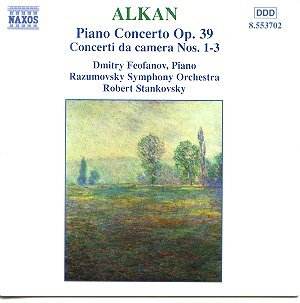CHARLES-VALENTIN ALKAN (1813-1888)
complete works for piano and orchestra
Piano Concerto Op. 39 24.49
Concerto da Camera No. 1 Op. 10 14.18
Concerto da Camera No. 2 7.31
Concerto da Camera No. 3 (recon Hugh Macdonald) 5.13
 Dmitri Feofanov (piano) Razumovsky
SO/Robert Stankovsky
Dmitri Feofanov (piano) Razumovsky
SO/Robert Stankovsky
 rec 16-18 Dec 1995 Bratislava
NAXOS 8.553702 [52.01]
rec 16-18 Dec 1995 Bratislava
NAXOS 8.553702 [52.01]
Crotchet
Amazon UK Amazon USA

Alkan is still a somewhat peripheral figure. I remember listening with passing
interest to an EMI single LP of an Alkan recital played by Ronald Smith in
the early 1970s. He has intruded hardly at all into my musical experience
since then. Now along comes this disc courtesy of Colin Scott Sutherland
- who, I must declare, was not impressed with the music.
First of all (and rather oddly) I pay tribute to the detailed notes by Alan
Ho, Hugh Macdonald and Dmitri Feofanov. You could hardly ask for much more
although I do wish it had been easier to find a date for each concerto. The
notes are excellent, extensive and informative. They make a really good read.
Stylistically the music is best thought of as being in the same compartment
as the concertos of Liszt, John Field and Chopin. There is even a touch of
the keyboard tricks the fortunate amongst us recognise from the much later
Scriabin piano concerto.
The Alkan Piano Concerto is an orchestration by Karl Klindworth of the three
Op. 39 Etudes referred to collectively by Alkan as 'Concerto' These are Etudes
8 to 10 of the Op. 39 set. In Alkan's lifetime the Concerto was never played
complete and when it was played it was in excerpts. Thus the Portuguese virtuoso,
Jose Vianna da Motta (whose symphony is available from PORTUGALSOM and has
been reviewed on this site and whose piano concerto is soon to be released
by Hyperion) performed the first movement in Berlin in 1903. Think of the
orchestral treatment as an extension of Tchaikovsky's early symphonies
(particularly No. 3) and add in a perpetually strenuous piano part typical
of the high-flown romantic genre - rolling pearly runs of notes, clangorous
heroism and gently reflective soliloquising. I find it difficult to say much
more about the three concerti da camera. They are pretty much the same as
the Concerto. The stand-out star here is the truly lovely andante con
moto Concerto da Camera No. 3. Its thematic material bears quite a
resemblance to the concentrated spell created by the less obviously demonstrative
sections of Tchaikovsky's piano concerto. If you are looking for just over
five minutes of ideally balanced mood music then look no further. The disc
ends with the least impressive work: the first concerto da camera. It marks
time pleasantly as if an epigone of Beethoven's first piano concerto.
This is a nice production all round and one that romantic era piano fanciers
will have to have. Feofanov delights in music with which, going by his notes,
he is in close sympathy. All this is at super-bargain price. Naxos are
surreptitiously building their own romantic piano concerto series to vie
with Genesis, Vox's seven boxed sets and the de luxe Hyperion series.
Reviewer
Rob Barnett

